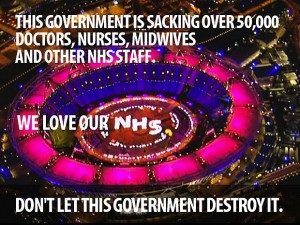This post is copied (with some omissions and a slightly altered title) from Just Plain Sense Blogs by Christine Burns MBE , licensed under a Creative Commons Attribution-Non-Commercial-Share Alike 2.0 UK: England & Wales License. See Google for author details.
- When you go to see your GP and they say you don’t need to see a consultant or should take such and such a drug you will no longer be sure whether that decision is because it is best for you or because the GP has their eyes on a new Mercedes. Giving groups of GPs (now called Clinical Commissioning Groups) control of £80,000,000,000 of the NHS budget means just that.
- When it takes longer to get an appointment with the GP it is likely to be because they are spending less time doing medicine and more time in meetings with staff from companies like KPMG who are making their commissioning plans for the board to rubber stamp. Commissioning is a complex process. Don’t imagine it can be achieved in a few minutes round a desk by a bunch of GPs in their coffee break. The health consulting industry is poised to move in. And how many GPs will know enough to challenge the advice of the experts, with all those impressive charts they’ll have?
- If you want to challenge those plans then you’ll find that the Clinical Commissioning Group that your practice is part of has decided that the meetings about such important things must happen in private. You’ll find local politicians hamstrung because of the complexity of the system and the relationships between bodies. Even the experts haven’t figured out yet how it will all work.
- If your GP does say you need to see a consultant then you’ll find that there’s an awfully long waiting list because your local hospital will be selling as much as 50% of its capacity to private patients. This is something that existing NHS hospitals will need to do just to balance the books, especially as the government starts rationing public money for the system, year on year.
- If your care requires collaboration then you’ll find it can’t happen because parts of the care path are being run by private companies who use different systems and, besides, planning services in that way could be seen as anti-competitive. The experts are still arguing whether the system known as ‘Any Qualified Provider’ means decisions about working together can be challenged using European Competition Law. What is certain is that GPs won’t know, and that the big money private providers lining up to exploit the uncertainty have pockets deep enough to afford the very best lawyers to challenge every commissioning decision they don’t like.
- If you have a specialist need then you’ll find you can no longer use your local hospital because your doctor’s commissioning group has contracted each condition to different private services which, for efficiency, serve large areas and are located 50 miles away. Note that some of the first services to be contracted out in this way will be things like maternity services, because the cost profile of these is very attractive to private providers. Your local NHS hospital will be left with the complex, chronic, expensive cases. It will have to take on private cases itself in order to make ends meet.
 In the longer term you’ll find a system in which doctors and nurses become increasingly scarce and are not keeping their skills up to date, because the system of teaching hospitals has broken down and the private providers don’t want to spend profits on training junior doctors. The Strategic Health Authorities who currently manage the commissioning and provision of training and ongoing development will be abolished in a couple of years and the health bill currently has no plan in it to replace that function. Health Education England (as mentioned by one of those White Papers that came out like confetti last autumn) is still no more than just a name.
In the longer term you’ll find a system in which doctors and nurses become increasingly scarce and are not keeping their skills up to date, because the system of teaching hospitals has broken down and the private providers don’t want to spend profits on training junior doctors. The Strategic Health Authorities who currently manage the commissioning and provision of training and ongoing development will be abolished in a couple of years and the health bill currently has no plan in it to replace that function. Health Education England (as mentioned by one of those White Papers that came out like confetti last autumn) is still no more than just a name.- The question of which practice you register with will suddenly be a lot more crucial, as this will determine which Clinical Commissioning Group will be paying for any care you need. Health will no longer be planned on the basis of the needs of a locality, but on the basis of the business plan for that collection of practices. Two adjacent surgeries may have very different budgetary priorities and it is quite possible this may actually be used in a deliberate way. For instance, a Clinical Commissioning Group (CCG) whose patients are all young middle class earning professionals without long term illnesses will have a much different cost base than one dealing with patients with chronic illnesses. PCTs currently balance that up by something called ‘risk pooling’. Most PCTs serve populations of 150-300,000 people. Within that there will be an average mix of all needs .. so the budget can withstand patients who suddenly need £70,000 on a heart transplant or long term kidney dialysis. If the balance is disturbed then the services with young and fit patients will pocket their profits whilst those serving less well patients will have to ration or go bust. Commissioning Groups WILL be able to go bust, like hospitals. So, if your GP says their list is full but the waiting room looks empty you’ll just have to wonder…
- We don’t know how the system will stand up when there is an epidemic or other health crisis because the whole system of public health is about to be reorganised on new lines and the SHAs and PCTs who formerly planned for and coordinated the system’s response to crises are already being taken apart and disbanded.
- And when all of this goes wrong, you are also likely to find that the Secretary of State for Health will step back and claim that his hands are tied and that it’s all now out of his control, because the traditional accountability vested in him for the last 63 years has been turned into something that armies of lawyers and politicians are still arguing over. ..
And just a reminder
The NHS wasn’t broken in the first place. In fact, various studies indicate that the present system has been on an all time high in terms of public approval, and that Britain’s health service delivers top class results for less percentage of national GDP than other systems.
The case for change was not backed by any evidence. Although a system this large and complex (employing 1.4 million staff) could always be improved around the edges, it was fundamentally healthy.
….
When the NHS is gone, it’s gone. These changes will not be able to be reversed.
The majority of Britons have been born and grew up under a health service that was run for the public good rather than for profit, and which was strategically managed in all our interests. Mostly we take it for granted that it is there when we need it. The rest of the time people probably don’t think about it that much…
Just Plain Sense Blogs post ends here.
While we’re on the subject, you might like to read Patients not Profits. How Markets dehumanise health.

